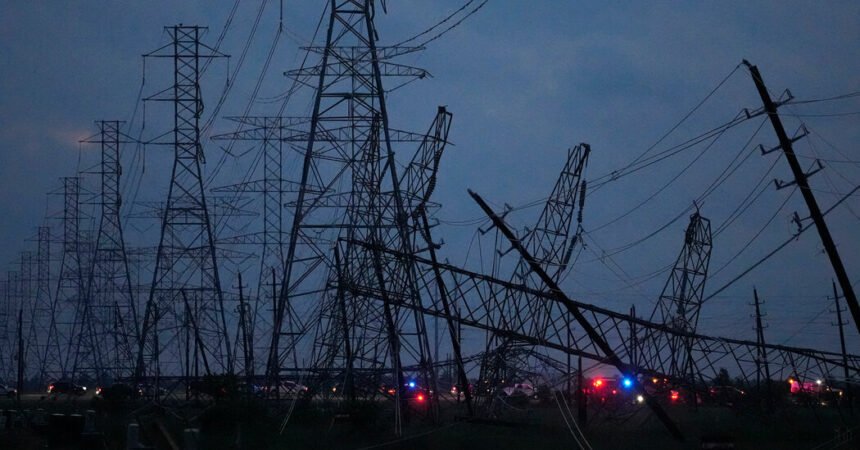[ad_1]
Recent Storm in Houston: A Wake-up Call for Climate Crisis
A bizarre windstorm referred to as a derecho (direct, in Spanish) recently hit Houston, hosting over two million residents and serving as the hub of the US fossil fuel industry.
With speeds reaching up to 100 miles per hour, the winds in mere minutes shattered office building windows, toppled trees, and caused electric poles and transmission towers to collapse. Approximately a million households experienced power outages, leaving them without light and air conditioning. Five days post-storm, over 100,000 homes and businesses remained affected by the extreme conditions.
Implications of the Storm
On the day of the derecho, temperatures in Houston, notorious for its humid summers, remained within a tolerable range of the low to mid-80s. Although the storm resulted in at least eight deaths, none were attributed to heat exposure.
Imagine a different scenario, where the storm struck during the Memorial Day weekend, when Houston’s temperature spiked to 96 degrees, with a heat index of up to 115. The resultant scenario could be akin to a heat-oriented Hurricane Katrina, warned Mikhail Chester, the director of the Metis Center for Infrastructure and Sustainable Engineering at Arizona State University. The 2005 hurricane had caused extensive damage to Louisiana and New Orleans, claiming over 1,300 lives.
Climate Catastrophe: A Threatening Perspective
Most of the deaths during Katrina resulted from causes such as drowning, injuries, or heart conditions. Chester used the Katrina instance metaphorically to depict the potential devastation a city might face in the event of an extreme climate catastrophe. For example, in New Orleans, relentless rains overpowered the levee system, resulting in approximately 80% of the city submerged underwater. What if an equivalent catastrophe affects the electrical supply during a severe summer heatwave in a city like Houston, massively reliant on air-conditioning?
Impact of an Extreme Climate Disaster
Chester hypothesized that an extreme heat crisis coupled with a power outage in a prominent city might reveal regional infrastructure vulnerabilities, possibly leading to thousands or even tens of thousands of heat exposure deaths within days. The risks for city dwellers would increase due to the concrete and asphalt environment, which could amplify the heat, causing temperatures to rise 15 to 20 degrees higher than surrounding areas covered with vegetation.
Warnings for our Warming World
The derecho that struck Houston acts as a reminder of the escalating risks posed by our rapidly warming planet. Proving this point, another windstorm led to power outages for hundreds of thousands of homes and businesses in Dallas just ten days after the Houston blackout.
Unfortunately, a common misconception about the climate crisis suggests that modern technology will allow us to adapt and overcome whatever comes our way. This belief is alarmingly misguided. Our perceived invincibility bubble is far more delicate than we might assume. What might our future hold in the event of a heat Katrina?
Understanding the Impact of Major Blackouts
A study conducted last year by researchers at the Georgia Institute of Technology, Arizona State University, and the University of Michigan took a detailed look into the impact of a major blackout during an extreme heatwave in three cities: Phoenix, Detroit, and Atlanta. For the study, the cause of the blackout was unspecified, making it relevant regardless of whether the blackout was due to a hurricane or a cyber-attack.
Blackpile Outcomes
The researchers selected those three American cities based on their distinct demographics, climates, and reliance on air-conditioning. Detroit has 53 percent of buildings equipped with central air-conditioning, compared with 94 percent in Atlanta and 99 percent in Phoenix. They simulated the potential health outcomes for a two-day, citywide blackout during a heatwave, with electricity gradually returning over the following three days.
A striking finding was that in Phoenix, about 800,000 individuals, roughly half the population, would need emergency medical treatment for heatstroke and other heat-related illnesses. The significant influx of patients could quickly overwhelm the city’s hospitals, and eventually, more than 13,000 individuals would succumb to the conditions.
City-to-City Impact
An equivalent scenario in Atlanta would yield 12,540 emergency room visits and six fatalities. Detroit, having a larger percentage of older residents and a higher poverty rate than other cities, would witness 221 deaths.
Global Warming Impact
Temperature spikes across the globe are making it increasingly harder for our bodies to cope, increasing the risk of heatstroke and other heat-related illnesses. Last year was the warmest on record, with the 10 hottest years occurring in the last decade.
Reducing the Climate Crisis Risks
Efforts to reduce these risks could include designing cities with fewer concrete and asphalt surfaces and more parks, trees, and access to bodies of water. Cities need to implement more comprehensive heatwave warning systems and develop emergency response plans targeted at the most vulnerable residents.
A More Resilient Grid
Emphasizing the grid’s resilience is also equally important. By improving barriers at grid operation centers, digital interventions can be prevented. Transmission lines can sustain storms when buried underground, and the increasingly affordable batteries can store electricity for emergencies.
However, as the temperature rises, the grid becomes vulnerable with the demand for electricity spiking due to the high usage of air conditioners. One suggestion is encouraging people to reduce power demand in their homes with high-efficiency heat pumps, better insulation, and smart thermostats, and generate their power with solar panels and battery storage.
In conclusion, the looming threat of a heat Katrina is a stark reminder of how our constant use of fossil fuels has escalated global warming, putting thousands of lives at risk. We must learn to either find better ways to adapt to the heat or bring back old methods for survival in hot climates.
[ad_2]









